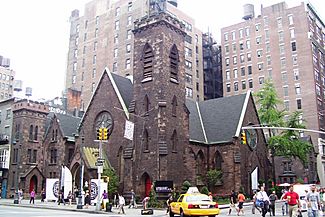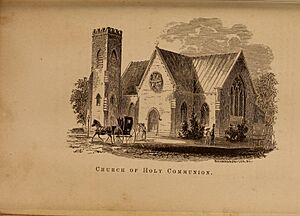Church of the Holy Communion and Buildings facts for kids
|
Church of the Holy Communion and Buildings
|
|

The buildings in 2010, as the Limelight Marketplace
|
|
| Location | 656–662 Avenue of the Americas (6th Avenue) Manhattan, New York City |
|---|---|
| Built | 1844 |
| Architect | Richard Upjohn |
| Architectural style | Gothic Revival |
| NRHP reference No. | 80002680 |
Quick facts for kids Significant dates |
|
| Added to NRHP | April 17, 1980 |
The Church of the Holy Communion and Buildings are historic buildings in New York City. They are located at 656–662 Avenue of the Americas (also known as Sixth Avenue) at West 20th Street in the Flatiron District of Manhattan.
This building is a great example of Gothic Revival architecture in America. It was first built as an Episcopal church in 1845 and served its community until 1975. After that, the buildings were used for many different things. One of the most famous uses was as The Limelight nightclub from 1983 to 2003. Today, it is a gym.
The Church of the Holy Communion is an important New York City landmark. It was given this special status in 1966. It was also added to the National Register of Historic Places in 1980. The building is part of New York City's Ladies' Mile Historic District, which is known for its historic shopping areas.
Contents
History of the Church Building
The church building was designed by a famous architect named Richard Upjohn. It was built between 1844 and 1845. The church was officially opened in 1846. Later, in 1853, Upjohn also designed the Parish House and Rectory (a home for the church's leader) on West 20th Street. He then built the Sister's House in 1854.
The way the church was designed made it very important for buildings in the 1800s. It used brownstone blocks that were placed in a natural, uneven way. This made the church look like a small, old English church from the Middle Ages.
The church's founder, Reverend William Muhlenberg, was very involved in its design. He believed that the Gothic style was the best way to show Christian faith through architecture.
When the church was first built, the area around it was a popular place for people to live. Homes lined Sixth Avenue. But by the late 1800s, New York City grew, and the area became part of the "Ladies' Mile" shopping district. Big department stores and shops filled Sixth Avenue. By the time of World War I, these stores had either moved to other parts of the city or closed down.
The church had some very talented musicians who played the organ and led the choir. These included Lynnwood Farnam from 1920 to 1930, and Carl Weinrich from 1930 to 1943.
In 1975, the number of people attending the church became smaller. So, it joined with two other churches: Calvary Church and St. George's Church. The Church of the Holy Communion then leased its building to an organization called the Lindisfarne Association for 99 years.
The Lindisfarne Association
From 1976 to 1979, the building was the main office for the Lindisfarne Association. This group turned the church into a cultural center. Many interesting people visited and shared their knowledge. Poets like Gary Snyder and Wendell Berry read their poems. Musicians like Paul Winter gave concerts. Philosophers and teachers gave talks that later became books. People also learned about sacred architecture and different world religions.
However, the Lindisfarne Association found it hard to raise enough money to fix up the old building. Because of this, Lindisfarne moved to Crestone, Colorado, and gave the church building back to the Episcopal parish.
The church parish then sold the building to Odyssey House, a program that helps people. Odyssey House later sold the buildings to Peter Gatien, who was known for opening nightclubs. He opened the New York Limelight club there in 1983.
Later Uses of the Building
From 1983 until 2007, the church building was used as a nightclub called The Limelight. After some problems, it closed for a while. It reopened in 2003 under a new name, "Avalon," but it closed for good in 2007.
The building's time as the Limelight nightclub was even mentioned in a song! In 1985, singer Steve Taylor released a song called "This Disco (Used to be a Cute Cathedral)." The song's words talk about the club's name and its history.
On May 7, 2010, the building opened again as a shopping center called the Limelight Marketplace. It was advertised on buses, taxis, and billboards around the city.
In the fall of 2014, the building was changed into a David Barton Gym. This gym, along with four others in New York City, suddenly closed on December 21, 2016. But in June 2017, the building reopened as Limelight Fitness, which is a gym.
See also
 In Spanish: Iglesia de la Santa Comunión para niños
In Spanish: Iglesia de la Santa Comunión para niños
- Church of the Holy Communion, New Jersey
- Limelight (nightclub)
- St. George's Episcopal Church (Manhattan)
- Calvary Church (Manhattan)
- Church of the Holy Communion (St. Peter, Minnesota)
 | May Edward Chinn |
 | Rebecca Cole |
 | Alexa Canady |
 | Dorothy Lavinia Brown |





